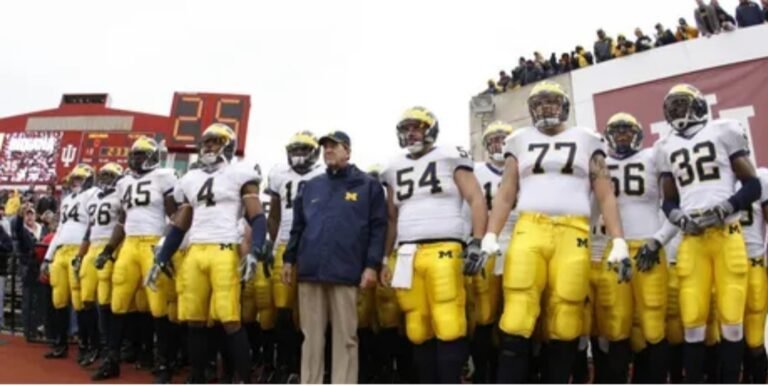In a significant legal development, over 300 former University of Michigan football players have joined a class-action lawsuit against the NCAA and the Big Ten Network.
The lawsuit alleges that these organizations unlawfully profited from the players’ names, images, and likenesses (NIL) without proper compensation.
Background of the Lawsuit
Initially filed in September 2024, the lawsuit began with four prominent former Michigan players: quarterback Denard Robinson, wide receiver Braylon Edwards, defensive end Mike Martin, and linebacker Shawn Crable. They accused the NCAA and the Big Ten Network of violating antitrust laws by denying them the opportunity to profit from their NIL during their collegiate careers.
The legal action seeks $50 million in damages, aiming to compensate for the alleged unauthorized use of player highlights and replays by the NCAA and the Big Ten Network. Attorney Jim Acho, representing the plaintiffs, emphasized that the lawsuit addresses the broader issue of athletes being denied their rightful earnings from NIL, a practice that has persisted for decades.
Expansion of the Plaintiff Group
Since its inception, the lawsuit has seen a substantial increase in participation, with more than 300 former Michigan football players now involved. This surge reflects a growing consensus among former athletes who feel they were exploited by the NCAA and the Big Ten Network.
Legal Context and Implications
The lawsuit is part of a broader movement challenging the NCAA’s historical stance on amateurism. In 2021, the NCAA revised its policies to allow current athletes to profit from their NIL. However, this change did not address past athletes who were previously prohibited from such earnings. The current legal action seeks to rectify this by compensating former players for the alleged unauthorized use of their NIL during their playing years.
The outcome of this lawsuit could have significant implications for the NCAA and its member institutions. A ruling in favor of the plaintiffs may set a precedent for similar cases, potentially leading to substantial financial liabilities for the NCAA and affiliated networks.
Statements from Involved Parties
As of now, the NCAA has not issued a public comment regarding the lawsuit. The Big Ten Network has also remained silent on the matter. Attorney Jim Acho has expressed optimism about the case, stating that it aims to correct longstanding injustices faced by former college athletes.
Conclusion
The lawsuit filed by over 300 former Michigan football players against the NCAA and the Big Ten Network marks a pivotal moment in the ongoing debate over athletes’ rights and compensation. As the case progresses, it is poised to influence the future landscape of collegiate athletics, particularly concerning the retrospective application of NIL rights and the financial responsibilities of governing bodies like the NCAA.



